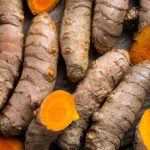Turmeric, known scientifically as Curcuma longa, has been revered for its medicinal properties for over 4,000 years. This vibrant yellow-orange spice, originating from the root of the turmeric plant, is a staple in Asian cuisine and a fundamental component of traditional Ayurvedic and Chinese medicine. In recent years, it has garnered significant attention for its purported health benefits, which span from reducing inflammation to aiding in cancer prevention. This article delves into the extensive range of turmeric's health benefits, its various uses, and the scientific evidence supporting its potential as a therapeutic agent.
Origin and Traditional Uses of Turmeric
Turmeric’s journey from ancient Ayurvedic medicine to modern kitchens worldwide is a testament to its versatile nature. Historically, it was used as a dye, given its vibrant hue, and as a remedy for diverse ailments, including digestive and liver problems, skin diseases, and wounds. The primary active compound in turmeric is curcumin, which is responsible for its bright color and many of its health benefits. Curcumin is a powerful antioxidant that helps to scavenge free radicals, damaging molecules that can lead to cell death and disease.
Anti-Inflammatory Properties
One of the most celebrated attributes of turmeric is its potent anti-inflammatory effects. Chronic inflammation is a common denominator in many diseases, including heart disease, cancer, and Alzheimer’s. Curcumin’s ability to inhibit the activity of inflammatory enzymes and molecules, such as COX-2 and TNF-alpha, is well-documented. By reducing inflammation, turmeric can alleviate chronic inflammatory conditions symptoms.
Arthritis, a condition characterized by joint inflammation, is one area where turmeric shows promise. Studies have shown that curcumin supplements can help reduce arthritis symptoms, including joint pain and stiffness. For instance, the Beaufort Memorial Health System discusses the increasing popularity of turmeric supplements in managing arthritis pain, highlighting its contribution to improving joint health.
Antioxidant Effects
Free radicals are highly reactive molecules that can damage cells, proteins, and DNA by oxidation. Antioxidants are compounds that neutralize free radicals, and curcumin is a particularly potent antioxidant. Curcumin helps protect the body from oxidative stress by scavenging free radicals.
Turmeric’s antioxidant properties also contribute to its potential in preventing and managing various diseases. For example, oxidative stress is a key player in the development of neurodegenerative diseases like Alzheimer’s. Curcumin’s antioxidant capabilities may help reduce the buildup of amyloid plaques in the brain, which are associated with Alzheimer's disease.
Turmeric and Cancer
Cancer is one of the leading causes of death worldwide, and finding effective preventive and therapeutic agents is a significant area of research. Curcumin has drawn attention in the scientific community for its potential role in cancer prevention and treatment. Curcumin can affect cancer cell growth and proliferation, promoting the death of cancer cells and inhibiting the spread of tumors.
Research suggests curcumin can interfere with several molecular pathways in cancer development. These include pathways related to cell proliferation, apoptosis (programmed cell death), and metastasis. For instance, Mount Sinai Health highlights studies indicating turmeric’s potential in fighting infections and some cancers.
Digestive Health
Turmeric has long been used as a remedy for digestive issues. It stimulates the gallbladder to produce bile, essential for digesting fats. This action can help improve digestion and reduce symptoms of bloating and gas. The German Commission E, a scientific advisory board, has approved using turmeric for digestive problems.
Irritable Bowel Syndrome (IBS) is a common gastrointestinal disorder characterized by chronic abdominal pain and irregular bowel habits. Early research suggests turmeric’s anti-inflammatory and antioxidant effects might help alleviate IBS symptoms. A diet incorporating turmeric could potentially support gastrointestinal health and improve overall digestion.
Cardiovascular Benefits
Heart disease remains the leading cause of death globally, and inflammation and oxidative stress are major contributing factors. Curcumin’s anti-inflammatory and antioxidant properties may help reduce the risk of heart disease. It can improve the function of the endothelium and the lining of blood vessels, enhancing blood flow and reducing the risk of clot formation.
Curcumin has also been shown to reduce LDL cholesterol (“bad” cholesterol) and triglycerides, both of which are risk factors for heart disease. By lowering these levels, curcumin helps protect against plaque buildup in arteries, thereby reducing the risk of atherosclerosis and subsequent cardiovascular events.
Neuroprotective Effects
The potential neuroprotective effects of curcumin are gaining interest, especially in the context of neurodegenerative diseases like Alzheimer’s and Parkinson’s disease. Inflammation and oxidative damage play crucial roles in these diseases.
One study cited by NewYork-Presbyterian found that older adults who consumed more curry had better cognitive function, potentially due to the curcumin in turmeric. While more research is needed to confirm these findings, the promising results suggest curcumin might help maintain cognitive health.
Immune System Support
Turmeric’s ability to modulate the immune system is another reason for its widespread use in traditional medicine. Curcumin can enhance the body’s immune response, crucial for fighting infections and diseases.
For example, curcumin has been found to increase the activity of immune cells like T-cells and macrophages, which are essential for identifying and destroying pathogens. This immunomodulatory effect suggests that turmeric could be beneficial in boosting overall immune health and offering additional protection against illnesses.
Skin Health
Turmeric has been traditionally used in skincare for its anti-inflammatory and antimicrobial properties. Curcumin can help treat various skin conditions, including acne, eczema, and psoriasis. Its ability to reduce inflammation and fight off bacteria makes it an effective natural remedy for these conditions.
Topical applications of turmeric, such as masks and creams, can help soothe irritated skin, reduce redness, and promote wound healing. Curcumin's anti-inflammatory properties also help minimize the appearance of scars and dark spots.
Diabetes Management
Diabetes is a chronic condition characterized by high blood sugar levels. Curcumin has shown potential in helping to manage blood sugar levels and improve insulin sensitivity. Research suggests that curcumin can enhance the function of beta cells in the pancreas, which are responsible for insulin production.
Moreover, curcumin's anti-inflammatory properties can help reduce the chronic inflammation associated with diabetes, contributing to better overall disease management.
Potential Side Effects and Precautions
While turmeric is generally safe when used in culinary amounts, overconsumption and long-term use of turmeric supplements can lead to adverse effects. High doses of turmeric or curcumin supplements can cause gastrointestinal issues like nausea, diarrhea, and stomach cramps. Additionally, turmeric can interact with certain medications, such as blood thinners and anti-inflammatory drugs, potentially leading to complications.
Individuals with gallbladder disease should avoid turmeric supplements, as it can exacerbate the condition. Moreover, turmeric might lower blood sugar levels, so individuals with diabetes should use it cautiously and consult their healthcare provider before incorporating it into their regimen.
Incorporating Turmeric Into Your Diet
Turmeric’s versatility makes it easy to incorporate into your daily diet. It is a key ingredient in curry powder and is used to flavor a variety of dishes, from soups and stews to rice and vegetable dishes. Here are some practical ways to include turmeric in your meals:
- Golden Milk: This popular drink, also known as turmeric latte, combines milk (dairy or plant-based), turmeric, and other spices like cinnamon and ginger. It's a comforting and health-boosting beverage.
- Turmeric Tea: A simple tea made by simmering water with turmeric, honey, and lemon. This soothing tea is perfect for a warming drink.
- Smoothies: Add a teaspoon of ground turmeric to your favorite smoothie recipe to boost its nutritional value.
- Seasoning: Sprinkle turmeric on roasted vegetables, eggs, or incorporate it into marinades for meats and tofu.
- Soups and Stews: Stir turmeric into soups, stews, and curries for an additional layer of flavor and health benefits.
Conclusion
Turmeric is more than just a spice; it is a powerful natural remedy with impressive health benefits. From its anti-inflammatory and antioxidant properties to its potential in preventing and managing chronic diseases, turmeric offers a promising complementary therapy. However, while the benefits are substantial, it is crucial to use turmeric responsibly, especially in supplement form, and always consult healthcare providers before starting any new treatment regimen.
Incorporating turmeric into your diet is a tasty and effective way to harness its health benefits. As research continues to unveil more about this golden spice, its role in modern medicine and nutrition will likely expand, bringing ancient wisdom and modern science together to pursue better health. For additional insights and to explore scientific studies on turmeric, visit Mayo Clinic and Medical News Today.
As awareness grows, turmeric's place in both kitchens and medicine cabinets worldwide is set to become even more prominent, making it a staple for those seeking natural ways to enhance their health and wellness.








